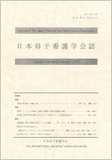Japanese
English
- 有料閲覧
- Abstract 文献概要
- 参考文献 Reference
目的
妊娠後期のカップルが考える出産後の家事、育児行動の役割に対する妊婦の期待とパートナーのやる気の一致度とカップルの関係性満足度との関係を明らかにすることを目的とする。
方法
2012年9月から5か月間に東京近郊にある病院の産婦人科外来で妊婦健康診査を受ける妊婦とそのパートナー100組のカップルを対象に、無記名自記式質問紙により、妊娠中のパートナーの関わり、出産後の家事や育児に関する期待や希望のカップルの一致度とカップルの関係に対する満足との関係を検証した。
結果
1.対象の背景
77組から回答を得た。妊婦の平均年齢は30.9(SD5.4)歳で、パートナーの平均年齢は32.9(SD6.4)歳であった。平均同居期間は3.2(SD3.1)年であった。パートナーの帰宅時間は20時30分が中央値で18時から24時の幅があった。妊娠後も帰宅時間が変わらない者が48名(69.6%)であり、また育児休業を取得予定の者は7名(10.3%)であった。
2.カップルそれぞれの認識
心身のサポートについては、妊婦は57.7(SD14.9)点、パートナーは56.9(SD15.1)点で有意差はなかった。出産後の家事につては妊婦が期待(21.1 点:最大36)しているよりもパートナーは積極的に行いたい(25.4点:最大36点)と思っていた。一方育児では沐浴、児への関わりについては妻の期待よりもパートナーのやる気が少なかった。出産後変化する生活では、子どもに対する愛情(妊婦:46名、パートナー:50名)、夫婦関係(妊婦:50名、パートナー:41名)はカップル共によく変わると回答していた。一方、生活をコントロールすること(妊婦:32名、パートナー:32名)については、妊婦は悪くなる(22名)と回答しているが、パートナーは良くなる(15名)と回答していた。
考察
対象は年齢、就業状態、夫婦関係満足度等日本の平均的な妊娠期のカップルである。出産後の家事、育児行動に対する妊婦の期待とパートナーがサポートしたいということはほぼ一致していた。しかし、生活のコントロールに対する認識、帰宅時間、育児休業取得の現状を鑑みると、パートナーの家事、育児行動は「やる気」で終わる可能性が高いことが示唆される。
PURPOSE:
We examined the present status of understanding of male support and the expected roles of the male partner in household and child-rearing activities in couples in late pregnancy, and whether this understanding might be related to the couples' satisfaction with each other.
METHODS:
The subjects were 100 couples in late pregnancy visiting an obstetrics clinic in Tokyo between August and December 2012.
The couples filled in a questionnaire anonymously, answering questions by choosing on a scale of 1 to 5. Questions for both partners pertained to their satisfaction level with each other and the expected roles of the male partner in supporting the female partner. The males were asked about their willingness to contribute to various types of household and child-rearing activities after the childbirth. Females were asked about the degree to which they wanted their male partners to contribute to those activities.
We calculated the score differences between the partners, and studied the relationship between the similarity in scores and the satisfaction level of the partners with each other.
RESULTS:
We received answers from 77 couples; two-thirds of the females had a job.
The average male came home at 8:30 p.m., and two-thirds of the males did not stop coming home late. Only seven males(10.3%) planned childcare leave.
The males generally showed more willingness than the females requested.
Couples with smaller differences in the scores tended to show better satisfaction with each other.
DISCUSSION:
The couples had similar degree of willingness and request about housework and child- rearing activities. However, at the time of the study, few males showed it in action, e.g. coming home earlier or planning childcare leave.
Copyright © 2014, The Japan Maternal and Infant Caring Association All rights reserved.


